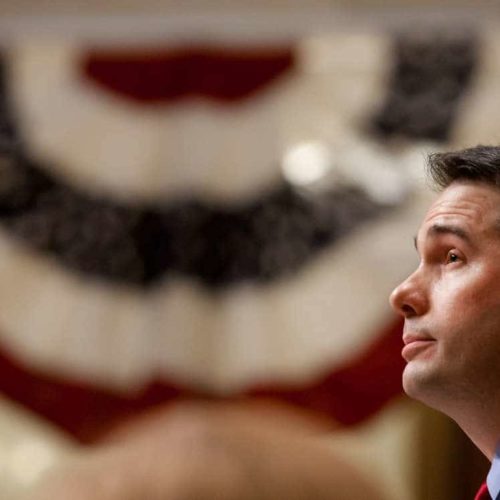Introduction
Wisconsin Gov. Scott Walker signed into law on Wednesday measures that transform campaign finance rules and a government accountability board — two bills pushed by the very same conservative political groups implicated in an investigation into his campaign.
The new laws arrive five months after Wisconsin’s state Supreme Court closed a three-year investigation into whether Walker and moneyed conservative nonprofits illegally coordinated campaign strategy during the Republican’s 2012 recall campaign for governor. The court cleared Walker and conservative allies of any wrongdoing on the basis that Wisconsin’s campaign finance laws were “unconstitutionally vague and broad,” opening the doors for legislative rewrite.
Then the same groups named in the investigation, Wisconsin’s Manufacturers and Commerce and Wisconsin Club for Growth, pushed for the bills through lobbying and robocalls.
Now, with the victory in hand, they and other groups will be permitted to coordinate more with candidates on campaign strategy, the same activity that prompted what was known as the John Doe investigation.
A separate measure dismantles the Government Accountability Board, the same state agency that launched the probe into Walker’s purported coordination with his conservative allies.
“Wealthy, special interests are having a field day in Wisconsin,” said Daniel Tokaji, an election law professor at Ohio State University.
State records show only three groups registered to lobby in favor of the two measures, one of them a familiar name: Wisconsin’s Manufacturers and Commerce, the state chamber of commerce.
Its business advocacy arm — WMC Issues Mobilization Council — was one of the groups named in the John Doe investigation into Walker’s alleged coordination. The group spent an estimated $4.8 million on state-level ads in 2014, running more than 2,000 negative ads targeting Mary Burke, a Democrat who lost to Walker in the gubernatorial race.
Meanwhile, Wisconsin Club for Growth launched a robocall campaign asking voters to ask their legislators to support restructuring the Government Accountability Board, according to The Capitol Times. The conservative nonprofit filed the lawsuit to end the John Doe investigation into its communication with Walker’s campaign team.
Court documents from the John Doe investigation revealed that Walker and Wisconsin Club for Growth coordinated campaign activity in 2012. A Walker aide directed Walker’s donors to conservative nonprofit Wisconsin Club for Growth, which “can accept corporate and personal donations without limitations and no donors disclosure,” as the aide said in an email revealed in court documents.
The two groups themselves are also connected to each other. WMC Issues Mobilization Council received $500,000 from Wisconsin Club for Growth in 2013, according to tax records. Both groups report to the Internal Revenue Service that they do not engage in any political activity.
Neither group responded to requests for comment.
Separately, Americans for Prosperity, a politically active nonprofit backed by conservative billionaires Charles and David Koch, also lobbied for the bills, according to state records.
Americans for Prosperity, which has staff in 35 states, typically supports conservative Republicans by building a strong ground force in its states. The organization increasingly engages in state and local politics, throwing its hat into the ring in elections as local as school board races.
Though it is not clear how much time Americans for Prosperity spent lobbying for the election bills, the group’s lobbying seems to be growing. In just the first half of 2015, the nonprofit spent over $250,000 on lobbying in Wisconsin, more than twice as much as it spent in 2013 and 2014 combined.
Under the new law, groups like WMC Issues Mobilization Council will be permitted to coordinate with candidates on campaign ads, so long as the ads avoid key words like “vote for” or “vote against.”
The law also doubles contribution limits for candidates and removes a measure that required donors to disclose their employers.
Campaign finance lawyer Mike Wittenwyler said the campaign finance law simply codifies pre-existing behavior shaped by previous court decisions.
“It provides some clarity, but it doesn’t do much beyond that,” said Wittenwyler, who represents interest groups both on the right and left.
But Jay Heck, executive director of advocacy group Common Cause in Wisconsin, said the new law will allow for more secret money to flow into the state.
“Wisconsin will become much more ripe for corruption,” Heck said.
Already, Wisconsin scored a D in the Center for Public Integrity’s 2015 State Integrity Investigation. It ranked 20th in the nation largely because of the public’s lack of access to information before these laws were changed.
The second law dismantles the Government Accountability Board, replacing it with two commissions: one that oversees elections and another that oversees ethics. The new boards will each be comprised of six partisan appointees from both parties in a setup that mirrors the gridlocked Federal Election Commission.
The composition of the boards, Heck said, was intentional.
“It’s going to be a toothless agency of partisans,” Heck said. “It’s designed to fail.”
But others see it as a way to prevent witch hunts.
“It’s my hope that the new bi-partisan agency will protect the rights of Wisconsinites instead of trampling them,” read a statement by Eric Bott, director of Wisconsin’s chapter of Americans for Prosperity.
One person familiar with the influx of money in Wisconsin elections is Penny Bernard Schaber, a former Democratic assemblywoman who ran for state Senate in 2014. WMC Issues Mobilization Council aired about $153,000 worth of TV ads attacking Bernard Schaber for raising taxes while taking a pay raise, a claim she says was factually untrue.
“Tell Penny Bernard Schaber not every piece of the pie belongs to the government,” the ad’s narrator says.
The new laws, she said, will only continue to saturate Wisconsin politics in money from “untraceable” sources.
“It’s nearly impossible to fight these kinds of ads and spending,” Bernard Schaber said.
And regulating the flow of money will be much more difficult with the dismantling of the Government Accountability Board, said Tokaji at Ohio State University.
“If in the future, people in Wisconsin see their politics becoming more corrupt, they can look back at this year and the signing of these bills as a pivotal moment,” Tokaji said.


Join the conversation
Show Comments